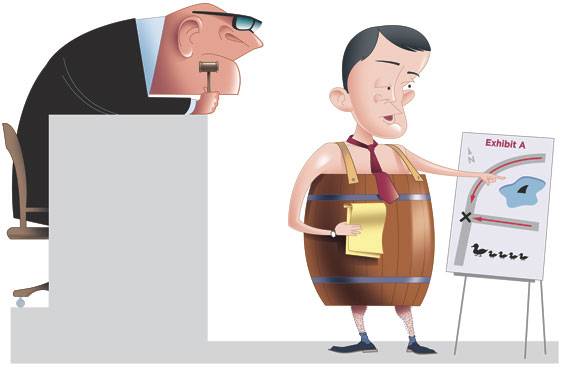Thursday, July 28, 2011 | 2 a.m.
Sun Archives
- Las Vegas unemployment at 13.8 percent (7-22-2011)
Southern Nevada’s battered economy is taking a toll on young attorneys just as it is other professions, with graduates of UNLV’s Boyd School of Law entering a job market that has fewer openings and lower starting pay.
A State Bar of Nevada survey published last month of members age 36 or under or who have practiced less than five years found that the most common base salary this year ranges from $80,001 to $85,000, compared with $90,001 to $95,000 in 2007.
The latest survey’s preparers, Las Vegas attorney Ryan Works with the law firm McDonald Carano Wilson, and Layke Stolberg, Boyd’s career services director, said valley law firms are beginning to hire again after going through layoffs that reflected a steep drop-off in business.
“If you are talking about an uptick, it’s an uptick from a very low level,” said Works, outgoing chairman of the bar’s young lawyers section. “The folks who were coming in 2009 and 2010 to get employment were simply stonewalled.
“Now that things have leveled off in terms of the economy, people are starting to rehire,” he said. “I don’t think we will see the rapid, wild growth in hiring that we saw three or four years ago when people were taking on many associates and a bunch of different litigation lawyers.”
But not everyone is on equal footing. Works and Stolberg say attorneys with expertise in bankruptcy law have a better chance of finding work than those who specialize in real estate deals, which have been pummeled by the recession.
“I’ve seen the bankruptcy practices in all the big firms grow,” said Works, himself a bankruptcy specialist.
Another phenomenon of the layoffs is that many newly graduated lawyers find themselves competing for jobs with others who have some experience but who lost their positions during the recession.
“In that market we’re seeing a lot of firms seeking attorneys with one to five years of experience,” Stolberg said. “The thinking might be that these attorneys can hit the ground running.”
But many recent graduates who are well-trained and likable stand as good a chance of getting hired as those attorneys seeking to switch employers, Works said.
“There is something to be said about hiring someone fresh out of law school who is going to probably come in at a lower salary level than a lateral transfer,” he said. “To be frank, there’s a lot of things that a first- or second-year lawyer will do that a lateral attorney won’t do or doesn’t want to do, like legal research and original drafting.”
Despite the tighter job market, Stolberg said most new graduates are still finding employment, though not always in fields of law. Boyd, which had 153 first-year students last school year, saw 93.2 percent of its 2010 graduates get jobs within nine months of earning their degrees. Of those 136 graduates who got jobs, 73 landed positions in private practice, 27 became clerks for judges, 14 went into other businesses, 12 got other government jobs, seven accepted public-interest work and three took academic positions. Still, that was down from a 94.3 percent job-placement rate for 2009 graduates.
Their average starting salary was $71,456, according to the law school. But that was roughly $3,500 less on average than what Boyd’s 2007 graduates earned in their first year out of school.
Likewise, Works said he isn’t surprised that starting salaries for recent graduates who get jobs in private practice are lower than they were before the recession. The most common salary range for those graduates last year was $60,001 to $65,000, about on par with the national average for first-year attorneys.
“We’re not seeing the first-year salaries that lawyers saw coming through the door three, four, five years ago,” he said. “The folks who are employed at this time are lucky to have employment at all. For me it’s such a small job market in town. You have to look around and say that there are only so many legal jobs to go around, and there’s only so many clients to employ those law firms, and a lot of those clients are out of business. A lot of those clients are bankrupt. A lot of those clients moved out of Nevada.”
Law school graduates are not only facing a tight job market, but many are also saddled with enormous student-loan debt. The survey, which had 207 respondents, found that the median debt among them was $60,001 to $70,000. Only 21 respondents said they had no debt.
Stolberg, who grew up in Boulder City, actually thought the median debt would be higher because of her own experience. She attended law school at Boston University, a decision that earned her a degree but also a $90,000 debt, thanks in large part to out-of-state tuition.
“I certainly wasn’t thinking very smartly at the time about what it would be like to pay that off,” she said.
It just so happens that programs and panel discussions Stolberg is preparing for Boyd students and graduates this fall include a speaker who will discuss ways to address student-loan debt.
“We’ll have panels with small and medium-size firms and we’ll have a speaker talking about starting your own solo practice out of law school,” she said. “We’ll also be talking about professional development and the importance of networking.”


Join the Discussion:
Check this out for a full explanation of our conversion to the LiveFyre commenting system and instructions on how to sign up for an account.
Full comments policy